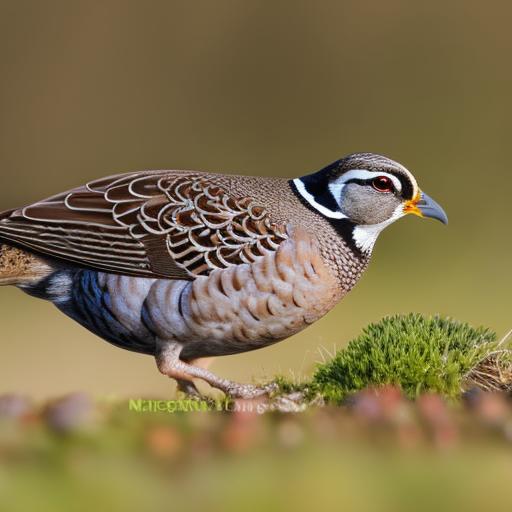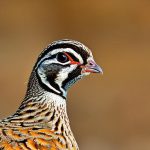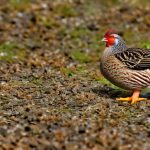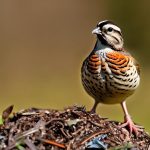Dutch quail, also known as Coturnix coturnix, are small, ground-dwelling birds that are popular for their meat and eggs. They are native to Europe, Asia, and Africa and have been domesticated for centuries. Dutch quail are known for their gentle nature and easy care, making them a popular choice for backyard poultry enthusiasts and small-scale farmers. These birds are also valued for their ability to lay eggs year-round, making them a reliable source of protein for their owners. Dutch quail come in a variety of colors, including brown, white, and speckled, adding to their appeal as an ornamental bird. Whether you are interested in raising Dutch quail for their eggs, meat, or simply as a hobby, they are a delightful addition to any flock.
Dutch quail are relatively low-maintenance birds, making them an ideal choice for beginners or those with limited space. They are hardy and adaptable, able to thrive in a variety of climates and environments. Dutch quail are also known for their calm and sociable nature, making them easy to handle and care for. With the right housing, nutrition, and care, Dutch quail can provide their owners with a steady supply of eggs and meat, making them a valuable addition to any small farm or homestead. In this article, we will explore the housing and care, feeding and nutrition, breeding and reproduction, health and disease management, and the benefits of keeping Dutch quail. Whether you are a seasoned poultry keeper or new to raising birds, this comprehensive guide will provide you with all the information you need to successfully raise and care for Dutch quail.
Key Takeaways
- Dutch Quail are small, hardy birds that are easy to care for and can be kept in small spaces.
- When housing Dutch Quail, provide a secure and well-ventilated coop with clean bedding and access to fresh water.
- Feeding Dutch Quail a balanced diet of commercial quail feed, supplemented with greens and protein, is essential for their health and productivity.
- Breeding Dutch Quail requires a ratio of one male to every four females, and proper nesting boxes for egg laying.
- Regular health checks, cleanliness, and vaccination are important for preventing diseases in Dutch Quail.
- Keeping Dutch Quail can provide a sustainable source of eggs and meat, as well as opportunities for hobbyists and small-scale farmers.
- In conclusion, keeping Dutch Quail can be a rewarding and relatively low-maintenance endeavor, as long as proper care and attention are given to their housing, nutrition, breeding, and health needs.
Housing and Care for Dutch Quail
When it comes to housing Dutch quail, it is important to provide them with a safe and comfortable environment that meets their specific needs. Dutch quail are ground-dwelling birds that require ample space to move around and forage. A spacious coop or aviary with plenty of room for exercise is essential for keeping Dutch quail healthy and happy. The coop should be well-ventilated and protected from drafts, as these birds are sensitive to temperature extremes. Additionally, the coop should be predator-proof, with secure fencing and a sturdy roof to keep out potential threats such as foxes, raccoons, and birds of prey.
In terms of bedding, Dutch quail do well on a substrate of clean straw or wood shavings. This provides a soft and comfortable surface for the birds to walk on and helps to absorb moisture and waste. Regular cleaning of the coop is essential to prevent the buildup of ammonia and bacteria, which can lead to respiratory issues and other health problems. Providing a dust bath area in the coop is also important, as it allows the quail to engage in natural grooming behaviors and helps to keep their feathers clean and healthy. Overall, providing a spacious and well-maintained living environment is crucial for the health and well-being of Dutch quail.
In addition to proper housing, Dutch quail also require regular care and attention from their owners. This includes providing fresh water daily, as well as a balanced diet of high-quality feed. Regular health checks should also be conducted to monitor the birds for signs of illness or injury. By providing a safe and comfortable living environment and attentive care, Dutch quail can thrive and provide their owners with years of enjoyment.
Feeding and Nutrition for Dutch Quail
Feeding and nutrition play a crucial role in the health and well-being of Dutch quail. These birds require a balanced diet that provides them with the essential nutrients they need to thrive. A high-quality commercial quail feed is an excellent option for providing the necessary nutrients, vitamins, and minerals that Dutch quail need to stay healthy. Look for a feed that is specifically formulated for quail and provides a balanced mix of protein, carbohydrates, fats, vitamins, and minerals.
In addition to commercial feed, Dutch quail can also benefit from supplemental treats such as fresh fruits and vegetables, mealworms, and greens. These treats can provide additional nutrients and variety to their diet, as well as enrichment and mental stimulation. It is important to offer treats in moderation, however, as overfeeding can lead to obesity and other health issues.
Fresh water should be available at all times for Dutch quail. Waterers should be kept clean and free of debris to prevent contamination and ensure that the birds have access to clean drinking water. In addition to providing fresh water, it is important to monitor the birds’ water intake to ensure they are staying properly hydrated.
Overall, providing a balanced diet of high-quality commercial feed, supplemented with occasional treats, along with access to fresh water is essential for meeting the nutritional needs of Dutch quail. By providing a well-rounded diet, owners can help ensure that their quail remain healthy and productive.
Breeding and Reproduction of Dutch Quail
Breeding Dutch quail can be a rewarding experience for poultry enthusiasts. These birds are prolific layers and can produce a large number of eggs throughout the year. To successfully breed Dutch quail, it is important to provide them with the proper environment and care that encourages natural mating behavior.
When it comes to breeding Dutch quail, providing a spacious and comfortable living environment is essential. A well-designed breeding pen with ample space for the birds to move around and engage in natural mating behaviors is crucial for successful breeding. The pen should be equipped with nesting boxes or areas where the hens can lay their eggs in privacy.
In terms of breeding behavior, male quail will often perform a courtship display to attract females. This may include vocalizations, puffing up their feathers, and performing a “tidbitting” display where they offer food to the female. Once mating has occurred, the female will lay her eggs in the nesting area provided. It is important to collect the eggs daily to prevent them from being damaged or eaten by the birds.
Once the eggs have been collected, they can be placed in an incubator or under a broody hen for hatching. The eggs will typically hatch within 17-18 days, at which point the chicks will require warmth, food, and water to thrive. Providing a warm brooder area with access to chick starter feed and fresh water is essential for the health and well-being of the chicks.
Overall, breeding Dutch quail requires providing a suitable breeding environment that encourages natural mating behavior, collecting and incubating eggs for hatching, and providing proper care for the chicks once they hatch. With the right environment and care, breeding Dutch quail can be a rewarding experience that allows owners to expand their flock and enjoy the delights of raising young quail.
Health and Disease Management for Dutch Quail
Maintaining the health of Dutch quail is essential for their well-being and productivity. Like all poultry, these birds are susceptible to a variety of health issues and diseases that can impact their overall health. By implementing proper management practices and monitoring the birds regularly, owners can help prevent illness and ensure that their quail remain healthy.
One of the most important aspects of health management for Dutch quail is providing a clean living environment. Regular cleaning of the coop or aviary is essential for preventing the buildup of waste and bacteria that can lead to respiratory issues and other health problems. Additionally, providing proper ventilation in the coop helps to reduce humidity levels and prevent the growth of mold and bacteria.
In addition to maintaining a clean living environment, it is important to monitor the birds regularly for signs of illness or injury. Common signs of illness in quail include lethargy, decreased appetite, abnormal droppings, respiratory issues, or changes in behavior. If any of these signs are observed, it is important to seek veterinary care promptly to diagnose and treat any potential health issues.
Preventative measures such as vaccination against common poultry diseases can also help protect Dutch quail from illness. Consult with a poultry veterinarian to determine which vaccinations are recommended for your specific location and flock size.
Overall, maintaining the health of Dutch quail requires providing a clean living environment, monitoring the birds regularly for signs of illness or injury, seeking veterinary care when needed, and implementing preventative measures such as vaccination. By taking these steps, owners can help ensure that their quail remain healthy and productive members of their flock.
Benefits of Keeping Dutch Quail

There are numerous benefits to keeping Dutch quail that make them an attractive option for poultry enthusiasts. Whether you are interested in raising these birds for their eggs, meat, or simply as pets, there are many reasons why Dutch quail are a valuable addition to any flock.
One of the primary benefits of keeping Dutch quail is their prolific egg-laying ability. These birds are known for laying a large number of eggs throughout the year, making them a reliable source of protein for their owners. Quail eggs are also prized for their nutritional value, being high in protein and rich in vitamins and minerals.
In addition to their egg-laying ability, Dutch quail are also valued for their meat production. These birds reach maturity quickly and can be raised for meat in a relatively short amount of time. Quail meat is lean and flavorful, making it a popular choice for culinary enthusiasts.
Beyond their practical uses for egg and meat production, Dutch quail are also valued for their gentle nature and sociable behavior. These birds are easy to handle and care for, making them an ideal choice for beginners or those with limited space.
Overall, keeping Dutch quail offers numerous benefits including prolific egg-laying ability, meat production potential, gentle nature, easy care requirements making them an ideal choice for poultry enthusiasts looking to add a valuable addition to their flock.
Conclusion and Tips for Keeping Dutch Quail
In conclusion, Dutch quail are delightful birds that offer numerous benefits including prolific egg-laying ability, meat production potential gentle nature making them an ideal choice for poultry enthusiasts looking to add a valuable addition to their flock.
When it comes to keeping Dutch quail happy and healthy there are several key tips that can help ensure success:
1) Provide a spacious coop or aviary with plenty of room for exercise
2) Use clean straw or wood shavings as bedding
3) Offer high-quality commercial feed supplemented with occasional treats
4) Provide fresh water daily
5) Monitor the birds regularly for signs of illness or injury
6) Seek veterinary care promptly when needed
7) Implement preventative measures such as vaccination against common poultry diseases
By following these tips and providing proper housing nutrition care breeding management health management benefits keeping dutch quails will thrive providing years enjoyment productivity owners flock . Dutch quails are known for their high productivity and can provide owners with a steady supply of eggs. With proper care and management, these quails can thrive and bring years of enjoyment to their owners. Additionally, their small size makes them easy to house and care for, making them a great option for those with limited space. Overall, the benefits of keeping Dutch quails include their productivity, low maintenance, and the enjoyment of watching them thrive under proper care.
Looking to keep your Dutch quail healthy and happy? Check out this informative article on Poultry Wizard about the best vegetables for quails to eat. It’s important to provide a balanced diet for your quail, and this article offers valuable insights into their nutritional needs. For more tips on creating the perfect environment for your quail, including information on heating options for their coop, be sure to read the related article on choosing a heater for a chicken coop. Keeping your quail comfortable and well-fed is essential for their well-being, so take the time to explore these helpful resources. (source)
FAQs
What is a Dutch quail?
A Dutch quail is a type of quail that is known for its small size and distinctive coloring. It is a popular breed among quail enthusiasts for its friendly nature and ability to lay a large number of eggs.
How do you keep Dutch quail?
Dutch quail can be kept in a variety of housing setups, including cages or aviaries. They require a balanced diet of commercial quail feed, as well as access to fresh water and grit for digestion. They also need a clean and dry living environment to thrive.
What are the benefits of keeping Dutch quail?
Keeping Dutch quail can provide a sustainable source of eggs and meat for the owner. They are also relatively low maintenance and can be kept in small spaces, making them a popular choice for urban homesteaders.
What are some common health issues for Dutch quail?
Dutch quail are susceptible to a variety of health issues, including respiratory infections, parasites, and egg binding in females. It is important to monitor their health closely and seek veterinary care if any issues arise.
Are Dutch quail good for beginners?
Dutch quail are generally considered to be a good choice for beginners due to their small size, low maintenance requirements, and friendly disposition. However, it is important for beginners to do their research and be prepared to provide proper care for their quail.
Meet Walter, the feathered-friend fanatic of Florida! Nestled in the sunshine state, Walter struts through life with his feathered companions, clucking his way to happiness. With a coop that’s fancier than a five-star hotel, he’s the Don Juan of the chicken world. When he’s not teaching his hens to do the cha-cha, you’ll find him in a heated debate with his prized rooster, Sir Clucks-a-Lot. Walter’s poultry passion is no yolk; he’s the sunny-side-up guy you never knew you needed in your flock of friends!







